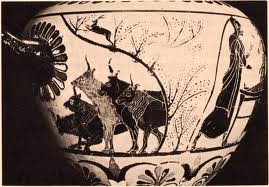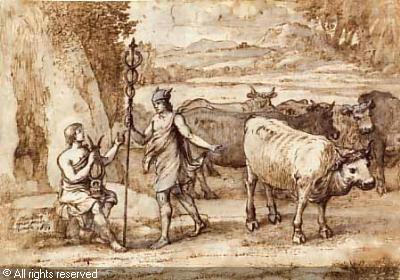You are currently browsing the tag archive for the ‘deal’ tag.
Ever since recounting the story of Orpheus, I have been thinking about the lyre. The ancient musical instrument even showed up again last week in a post about an amazing new planetary system–and the mythical harp of the gods somehow stole some of the glory from real worlds formed eleven billion years ago. Perhaps this is appropriate: for the myth of the first lyre is a story of theft.
It is also the origin story of Hermes, who was not just the messenger of the gods, but also the god of tradesmen, herdsmen, and thieves. Hermes was the child of Maia, the daughter of a Titan. After the war between Titans and Olympians, she hid herself away in a stygian cave which twisted down beneath Mount Cyllene, but one day, Zeus spied her and they became lovers. Maia’s cave provided the dallying pair with an excellent hiding place from the jealous eyes of Hera, and in due course Hermes was born. Even as a baby, the obstreperous little god, was too clever and mischievous to be hidden away in some cave. Baby Hermes sneaked out and soon found a herd of exquisite white cattle belonging to Apollo. The tiny god picked out the finest of these splendid sky cattle and rustled them off for himself and his mother, but before leading them away, he put brooms on their tails so they would erase their tracks. He also drove them out of their pasture backwards and disguised his own footprints by wearing branches on his feet. Then he took the white cows to a secret grove and sacrificed the two most beautiful beasts, burning everything but the entrails. These gut strings he attached to a turtle shell to play soothing music—the first lyre!
When Hermes got back to his cave, his mother was frantic with worry, but he quickly beguiled her with honeyed words and a sweet lullaby. In the meantime, Apollo had noticed that his best cattle were missing, and he began to hunt the thief… but it was no easy task. First the golden god could not find any tracks, and when he discovered the footprints, they lead back to the paddock (and there was no evidence of any thief). However Apollo was the god of prophecy and hidden truth, so he drew upon his divine augury to discover who had taken his cattle. In fury he rushed into Maia’s cave to grab the culprit, but, even as an infant, Hermes was swift and he outran the angry sun god. Soon the comic chase lead up to Olympus, where a proud Zeus, made the (half) brothers cease their quarrel.
Hermes returned the cattle, but two were still missing! Apollo demanded them back, but to no avail: they were burned up. Hermes pulled out his lyre hoping to lull Apollo as he had Maia, but the lovely music had an altogether different effect on the refined art-lover Apollo. As the god of music and beauty, Apollo was indeed beguiled, but he did not fall asleep. Instead he had to have the beautiful instrument! He begged his little brother, and cajoled, and finally offered him all the white cattle. Hermes drove a hard bargain and he also gained Apollo’s magical wand in the deal. This wand was the fabulous and disturbing caduceus—a winged golden rod wrapped by two snakes. It became the symbol of Hermes, and of commerce itself, but, according to myth it had yet deeper powers—to grant sleep, and death, and resurrection. Hermes touched the eyes of the departed with the caduceus and led them on their last journey. He used it to transcend the thresholds of the world and travel everywhere (although in the modern world it has become meddled with the staff of Asclepius).
Apollo received the lyre, and it became his defining symbol (along with his golden bow). In fact Apollo’s lyre became the symbol of all art and music–a role which it still holds. It is funny that the defining objects of the two gods were originally vice-versa (though maybe knowing mothers–and knowing merchants–will not find such a swap entirely unprecedented).





